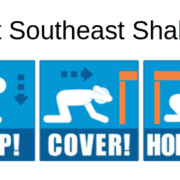Great Southeast Shakeout: World’s Largest Earthquake Drill Set for Tomorrow!
100.1 FM / 1450 AM WIZS; Local News broadcasts M-F 8am, 12pm, 5pm
-Press Release, NC Department of Public Safety
At 10:17 a.m. tomorrow, more than 2.3 million people will participate in the Great Southeast Shakeout, the world’s largest earthquake drill, including more than 350,000 school children in grades K-12.
Any individual, family, organization, school, agency, or business can register for the event. However, if you or your group haven’t registered you can still practice Drop, Cover, and Hold On, the recommended actions for people to take during an earthquake.
DROP – Get down on the floor when shaking starts before the quake drops you.
COVER – Take cover under a sturdy desk, table or other furniture. If you cannot find something to get under, crouch against an inside wall. Keep your head and neck safe by using your arms. Stay away from windows, hanging objects, mirrors or anything that might fall.
HOLD ON – Hold on to a desk, table or piece of furniture. Be ready to move with it during the quake
These simple steps allow you to get down before you’re thrown to the ground, provide protection from falling or flying items, and increase your chances of surviving a building collapse. If you are trapped, stay calm and tap on hard or metal parts of the structure to try and attract attention.
By identifying places you can shelter safely in your home or workplace and by practicing going to those places, you increase the likelihood of surviving an earthquake.
Visit https://www.shakeout.org/southeast/register/ where you can register, find fact sheets, drill manuals, drill broadcast recordings, flyers, videos and other materials that make it easy for your group to participate in the drill and be prepared.
North Carolina has its share of earthquakes, but large, damaging quakes are infrequent in our state, where severe weather and hurricanes are more common threats. Earthquake risk is highest in Western North Carolina, where small quakes occur regularly but are usually too mild to be detected without special instruments.

